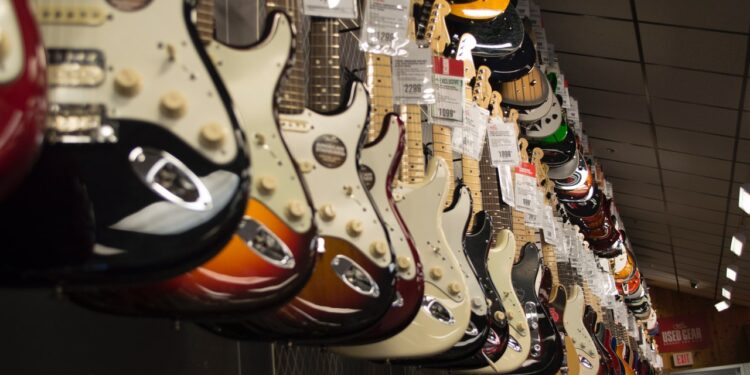CEO Andy Mooney riffs on the boom in guitar sales during COVID-19 and rethinking business models for the post-pandemic world.
Nearly a year into the COVID-19 pandemic, millions of us have taken up new hobbies, such as baking bread, bicycling, bird-watching — and playing guitar. That’s beautiful music to Fender Musical Instruments Corporation, the market leader in the US$8 billion stringed instruments market, especially after it initially looked like 2020 was going to be a bust. When lockdowns began last year in March, Fender CEO Andy Mooney went into belt-tightening mode, canceling orders; shuttering the company’s headquarters in Scottsdale, Ariz., and Los Angeles; closing factories in Corona, Calif., and Ensenada, Mexico; and furloughing production workers.
Then, in what Mooney described as a goodwill gesture, the private company — majority owned by Hawaii-based Servco Pacific Capital and Tokyo-based Yamano — offered Fender Play, its subscription-based online platform for learning guitar, bass, and ukulele, free for 90 days. Within weeks, the app attracted nearly 800,000 first-time players. Just as suddenly, many of those newbies started buying up iconic Fender guitars (Stratocasters, Telecasters, Jazzmasters), as well as amplifiers, effects pedals, and other gear. By October, Mooney was eyeing record sales.
Fender, which is celebrating its 75th anniversary in 2021, has counted among its devotees virtuosos such as Buddy Holly, Jimi Hendrix, Eric Clapton, Bonnie Raitt, Marcus Miller, H.E.R., and scores of other players. This lends a credibility and cachet that make Fender an in-demand brand among those who both appreciate and want to make music. In a recent Zoom interview with strategy+business from his home office in Hollywood, Mooney — a longtime guitarist himself — talked about how he has fine-tuned the brand’s proud legacy since taking the reins in 2015.
S+B: What happened to your business when COVID-19 hit and lockdowns went into effect throughout the United States?
MOONEY: Until March 17, it looked like 2020 was going to be our sixth [consecutive] year of double-digit growth. On that day, 90 percent of our nearly 1,000 dealers worldwide closed. Our offices and factories closed. We were staring at the edge of a cataclysmic drop-off in sales, so our focus was on cash preservation. We did everything possible to mitigate cash flow. We canceled orders, everybody in the company took pay cuts from 5 to 50 percent, and we canceled bonuses.
Early on after I joined Fender, we had moved all our distribution centers to third-party providers, taking out our capital and lease costs. That proved to be a big blessing, because our third-party provider in the U.S., FedEx, was an essential business. It never closed down when the rest of California, our factories, and our dealers did. We provided a lifeline to the dealers for their online sales, shipping them inventory we had in our warehouse during the early parts of the pandemic.
S+B: How did the pandemic disrupt your earlier plans to launch your line of updated electric guitars, the American Professional II?
MOONEY: Because we couldn’t have our sales reps on the road, we weren’t able to physically show dealers the guitars. Many dealers were only selling online and didn’t want to meet our reps, anyway. We did an online presentation, virtually taking them through the features and benefits of the new series of electric guitars and basses. And we said, “Trust us, we’re going to throw a lot of money behind this launch.” It worked. We had to push the introduction of the new line to October, but it’s beat all our expectations. We’re back-ordered into about spring of 2021, so it’s been a big success story.
In fact, the complete reverse of what we anticipated happening is happening. We’re now looking at expansion. As our revenues grew by about $100 million last year [to a record $700 million], we’ll have more money to spend to drive consumer demand this year. We’re looking to expand our Corona and Ensenada facilities, and we’re working with our OEM suppliers in Southeast Asia to get more capacity there. I’m not sure the growth rate we enjoyed last year will last into 2022, but I’m very optimistic we will get significant growth again in 2021 and beyond.
S+B: What are you seeing in terms of longer-term trends, and how will Fender navigate them?
MOONEY: I describe Fender not as recession-proof, but recession-resistant. People have a very strong emotional attachment to music, so we’re going to be affected by crises and downturns, but perhaps not as much as other companies. Our industry has been expanding at high single- or double-digit rates for the last 11 years, driven by consumption of recorded and live music. During the pandemic, music became a source of relief, with close to 400 million people globally subscribing to a streaming music service. Goldman Sachs is predicting that that number will grow to about a billion by 2030. Live music may have gone dark since March, but recorded music is having a field day.
And live music will make a gradual comeback in 2021. Major acts are already booking arenas for the spring of 2022, because everybody is eager to go back out on the road. So the category is in fundamentally great shape. There’s a lot of innovation going on and money being spent to drive sustained consumer demand.
With many things, the pandemic accelerated preexisting trends by two or three years. The trends of working from home, using Zoom as opposed to getting on an airplane, buying online as opposed to at a brick-and-mortar store: They all leapfrogged during the pandemic.
By Bob Wood
Read the full interview here.












